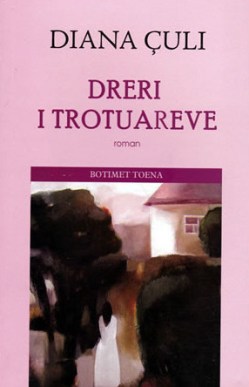 In an interview for an Albanian newspaper, Diana Çuli talked at length about the events that inspired her most famous book to date, Dreri i Trotuarëve (A Stag in the Boulevard): one morning in the late ‘60s, as Çuli walked to school with a group of female friends, a girl had jumped from the fifth floor balcony of her home, her fragmented body landing at their feet. Çuli explains that the girl had committed suicide after discovering that she was pregnant and her boyfriend had refused to marry her. An illegal abortion was not an option, and to the shame that she knew her actions would bring her family, it seemed she had preferred death.
In an interview for an Albanian newspaper, Diana Çuli talked at length about the events that inspired her most famous book to date, Dreri i Trotuarëve (A Stag in the Boulevard): one morning in the late ‘60s, as Çuli walked to school with a group of female friends, a girl had jumped from the fifth floor balcony of her home, her fragmented body landing at their feet. Çuli explains that the girl had committed suicide after discovering that she was pregnant and her boyfriend had refused to marry her. An illegal abortion was not an option, and to the shame that she knew her actions would bring her family, it seemed she had preferred death.
Before it was finally published in 1986, when the grip of the Communist Party on Albanians was beginning to slip very slowly following Enver Hoxha’s death, Dreri i Trotuarëve spent years hopping from one editor’s drawer to the next. Deemed too liberal for its times, no publisher wanted to run the risk of having its name associated with a work that centered on the life of a group of friends who were far more ambitious and open-minded that what was considered acceptable in Albania’s socialist utopia. Set in the 1970s and tackling everything from pre-marital sex, to abortion, to adultery and dissidence, Dreri i Trotuarëve has continued to captivate Albanian readers for decades since its original publication.
Part of the book’s long-lasting appeal rests in how it navigated and redefined stylistically and thematically the treacherous waters of Communist-era Albanian literature. To ensure that their writing was published without repercussion, many Albanian writers were forced to write following the rigid guidelines of the socialist realism movement which exalted Communism’s values. The very few who had a good relationship with Hoxha himself were allowed to tease these boundaries and discuss more salient topics by using intricate allegories, or focusing on the country’s distant past. In Dreri i Trotuarëve, however, Çuli deals intimately and faithfully with the country’s then-present, including its citizens’ daily, subtle rebellions. If she managed to avoid censorship, it was by both depicting these instances of rebellion and having her characters deal with their harsh consequences under the guise of just divine or government-incited punishment.
Dreri i Trotuarëve features a varied cast of characters, but what drives the plot forward is the relationship and dissolution of the lives of two students and ex-lovers, Vera and Fred. Vera’s story is definitely the more tragic of the two: after a brief relationship with Fred, she finds herself pregnant and terrified at the idea of confronting him. Interestingly, her fears are not necessarily born out of a potential rejection. What she fears instead is that Fred will be ready to take on this duty, and she will be trapped in a loveless marriage of convenience. Her reasoning is partly a result of female socialization, partly her own desire to not be someone’s second choice. Unable to rely on her family or friends, she turns for help to a cousin shunned for having a child out wedlock. When Vera knocks on her door unannounced, the cousin requires no explications. She instinctively knows why Vera has arrived on her doorstep.
Vera’s portion of the story is eerily reminiscent of Annie Ernaux’s Happening, translated by Tanya Leslie, from her panicked search for an illegal abortion provider, to the various attempts, while on vacation, to bring about a spontaneous abortion by throwing herself off cliffs, belly first. And just like in Happening, the only option for Vera is to rely on an existing and underground network of women who share their knowledge and support, no questions asked, despite the many tragic outcomes. Both books then are a stark reminder, even for our times, that illegal abortion never stopped abortion itself, it just made it deadlier.
But, while Vera’s story is inherently traumatic, Fred’s doesn’t start off that way. There is a tendency in Albanian literature about the Communist experience to highlight the worst elements of the regime, which is reasonable. But Fred’s story is a reminder that there was beauty even in the most absurd of circumstances. The book in fact opens with him: after winning a university championship, Fred is giddily rushing home to prepare for the birthday party of his latest crush. Fred and his friends dance to the rhythm of pirated Italian music, they talk about banned European art in clandestine bars and splash around in the Ionian Sea after spending the day doing government-mandated volunteer work.
Emboldened by these fleeting wisps of freedom, Fred becomes careless, associating himself with known dissidents and criticizing openly the regime’s interpretation of certain literary texts. These seemingly inconsequential infractions will determine the rest of his life, as one minor complaint leads to another and Fred’s reputation is irrevocably tainted. Once he finishes his university studies, despite marrying into a good family and his own father’s attempts to keep him close, he is sent to a remote village where he teaches a strict literary curriculum and has to navigate the parochial concerns of the school’s teaching body. While Çuli’s writing is never boring, there is no escaping the feeling as you read that a life lived like this is nothing but soul-crushingly tedious.
Diana Çuli confronts a number of essential issues in Dreri i Trotuarëve, and there is a crucial paradox at the novel’s core. On the one hand, Vera’s and Fred’s decisions, regardless of their respective impetuses, demonstrate that even under the most oppressive regimes there is no stopping the human propensity toward freedom, which offers a more existentialist interpretation of Dreri i Trotuarëve. And yet the consequences that Vera and Fred face could be read as Çuli’s attempt to circumvent censorship, or perhaps as a reminder that ambition is sometimes not enough and more often than not it is the system that wins. But despite this perhaps pessimistic reading, as Çuli herself admitted in the above-cited interview, the revolution that eventually ushered Albania into its now flawed democracy was one led by students themselves. The type of students who built antennas out of tin cans to capture the waves of Italian radio and lent each other prohibited books to be read by candle-light in a single night before being returned the day right after. In a sense, Dreri i Trotuarëve was both a faithful representation of a generation whose aspirations could not be stifled and a premonition of the turmoil to come.
Çuli, Diana. Dreri i Trotuarëve. TOENA, 2013.
 Diana Çuli (b. 1951) is an Albanian writer, journalist, translator and former politician. She is the author of various novels, screenplays and essay collections, like Rekuiem (1992), Diell në mesnatë (2000), Engjëj të armatosur (2006), Hoteli i drunjtë (2011) and more recently Vrasje në kryeministri (2018). Çuli served as head of the Independent Women’s Forum of Albania and was also as a member of parliament between 2005-2009. She has been an active proponent of women’s rights in Albania, including as an advocate for the decriminalization of abortion, which became legal only in 1996.
Diana Çuli (b. 1951) is an Albanian writer, journalist, translator and former politician. She is the author of various novels, screenplays and essay collections, like Rekuiem (1992), Diell në mesnatë (2000), Engjëj të armatosur (2006), Hoteli i drunjtë (2011) and more recently Vrasje në kryeministri (2018). Çuli served as head of the Independent Women’s Forum of Albania and was also as a member of parliament between 2005-2009. She has been an active proponent of women’s rights in Albania, including as an advocate for the decriminalization of abortion, which became legal only in 1996.
